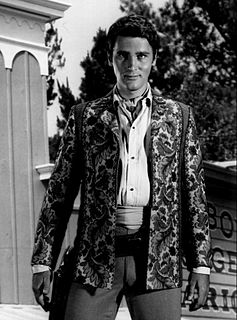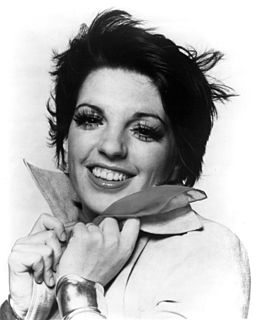A Quote by Shirley MacLaine
Audrey was the kind of person who when she saw someone else suffering tried to take their pain on herself. She was a healer. She knew how to love. You didn't have to be in constant contact with her to feel you had a friend. We always picked up right where we left off.
Related Quotes
She stared at herself in the mirror. Her eyes were dark, almost black, filled with pain. She'd let someone do that to her. She'd known all along she felt things too deeply. She became attached. She didn't want a lover who could walk away from her, because she could never do that - love someone completely and survive intact if her left her.
She looked at his young face, so full of concern and tenderness; and she remembered why she had run away from everyone else and sought solitude here. She yearned to kiss him, and she saw the answering longing in his eyes. Every fiber of her body told her to throw herself into his arms, but she knew what she had to do. She wanted to say, I love you like a thunderstorm, like a lion, like a helpless rage; but instead she said: "I think I'm going to marry Alfred.
Dena had always been a loner. She did not feel connected to anything. Or anybody. She felt as if everybody else had come into the world with a set of instructions about how to live and someone had forgotten to give them to her. She had no clue what she was supposed to feel, so she had spent her life faking at being a human being, with no idea how other people felt. What was it like to really love someone? To really fit in or belong somewhere? She was quick, and a good mimic, so she learned at an early age to give the impression of a normal, happy girl, but inside she had always been lonely.
This was something she would keep hidden within herself, maybe in place of the knot of pain and anger she had been carrying under her breastbone...a security blanket, an ace up her sleeve. She might never use it, but she would always feel its presence like a swelling secret stone, and that way when she let go of the rage, she would not feel nearly as empty.
Yet there were times when he did love her with all the kindness she demanded, and how was she to know what were those times? Alone she raged against his cheerfulness and put herself at the mercy of her own love and longed to be free of it because it made her less than he and dependent on him. But how could she be free of chains she had put upon herself? Her soul was all tempest. The dreams she had once had of her life were dead. She was in prison in the house. And yet who was her jailer except herself?
She (Judy Garland) was a friend of mine, a trying friend, but a friend. That is what I tell myself: She did everything she ever wanted to do. She never really denied herself anything for me. See, I say, she had a wonderful life; she did what she wanted to do. And I have no right to change her fulfillment into my misery. I'm on my own broom now.
She had said she didn't feel fear, but it was a lie; this was her fear: being left alone. Because of one thing she was certain, and it was that she could never love, not like that. Trust a stranger with her flesh? The closeness, the quiet. She couldn't imagine it. Breathing someone else's breath as they breathed yours, touching someone, opening for them? The vulnerability of it made her flush. It would mean submission, letting down her guard, and she wouldn't. Ever. Just the thought made her feel small and weak as a child.
She was the first person on either side of her family to go to college, and she held herself to insanely high standards. She worried a lot about whether she was good enough. It was surprising to see how relieved she seemed whenever I told her how amazing she was. I wanted her to feel strong and free. She was beautiful when she was free.
Yet losing him seemed unbearable. He was the one she loved, the one she would always love, and as he leaned in to kiss her, she gave herself over to him. While he held her close, she ran her hands over his shoulders and back, feeling the strength in his arms. She knew he’d wanted more in their relationship than she’d been willing to offer, but here and now, she suddenly knew she had no other choice. There was only this moment, and it was theirs.
I think I fell in love with her, a little bit. Isn't that dumb? But it was like I knew her. Like she was my oldest, dearest friend. The kind of person you can tell anything to, no matter how bad, and they'll still love you, because they know you. I wanted to go with her. I wanted her to notice me. And then she stopped walking. Under the moon, she stopped. And looked at us. She looked at me. Maybe she was trying to tell me something; I don't know. She probably didn't even know I was there. But I'll always love her. All my life.
She was perfect. I knew this the moment she emerged from my body, white and wet and wailing. Beyond the requisite ten fingers and ten toes, the beating heart, the lungs inhaling and exhaling oxygen, my daughter knew how to scream. She knew how to make herself heard. She knew how to reach out and latch on. She knew what she needed to do to survive. I didn’t know how it was possible that such perfection could have developed within a body as flawed as my own, but when I looked into her face, I saw that it clearly was.



































